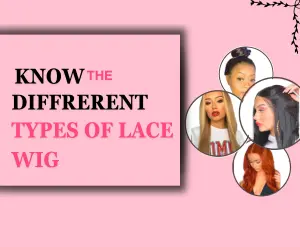
different types of lace wigs: Know Which one is your type
Things you should must know before buying any Lace wig, Know the different types of lace wigs first, and find your best one type

Are you wearing a wig made from unethical sources without knowing the qualities of human hair? Have you bought a wig as Remy but mistakenly chose a non-Remy one because of a lack of knowledge? So, take a plunge because after reading this article, you will be a master in knowing the hidden secrets of wig making, sources of human hair, different types of human hair, and beneficial points of picking human hair wigs.
If you decide to buy premium-quality human hair, one question always lingers where do human hair wigs come from? Without wasting your precious time, get the article started.
A robust statistic brought me notice that during 2020, 70,000 American faced hair loss due to alopecia, hormonal imbalance, cancer treatments, and environmental changes, due to which it is anticipated that hair factories will be expanded up to a CAGR of 16.6% in the coming 2027.
The most wig-demanded countries include the U.S. and native Africans, and the online sales of hair extensions accounted for 31.5% of the complete market share in 2021. (A study we find from Gitnux)
Despite the intense human hair industry, it is difficult to trace the origin of much of the hair in the market, and this is in no way surprising because the human hair trade has always been shady. The most prominent exporter of human hair is China, which holds 70% of the wholesale supply of human hair. Brazil, Caucasia, Russia, Vietnam, Mongolia, Malaysia, India, and the Philippians also have a massive share in providing quality human hair worldwide.
Where do human hair wigs come from? Come on, ladies, to know the details in depth.
Human hair wig companies are run chiefly due to respectable donors who donate their hair to cancer patients because of their kindheartedness with the only purpose of charity. Does the hair come from the same person? Typically, hair donors follow specific guidelines regarding the length, cleanliness, and health of their hair. They mostly donate 100-gram hair by cutting, packing, and sending it to charity institutes and wig-making companies. Some big companies may compensate donors for their reputable acts of kindness.
Hair salons are the best source to get human hair to make wigs. During haircuts, hair treatments, and styling sessions, clients’ hair drops to the floor, becomes has no value for the individual but matters most for the salon because these salons collect the hair that is called to be as ‘fallen hair’ for a more extended period then sold to wig’s manufacturers and got a lot of ready money. The hair collected from salons needs much processing because of a mixture of colors and textured hair.
The hair collected from temples, usually from India, is an excellent way to raise the hair industry. In certain cultures, individuals shave their hair as a symbolic act of devotion and spiritual offerings to temples that further use for various applications, including wig making.
Ladies sell their hair to support their families in China, India, Peru, Ukraine, Cambodia, and Vietnam, where human hair holds much value as a trade. Economic factors drive these poor ladies to sell their long, strong, and healthy locks to meet the requirement of their bread and butter, and hence human hair factories flourish at the cost of these splendid women.
Converting virgin or raw human hair into a wig is a meticulous process. We are all curious to find out. Let’s go over the procedure in more depth.
The foremost and first-hand step is gathering quality human hair from different sources like salons or temples, as discussed above in detail. The collected hair comes in multiple textures, volumes, densities, lengths, and colors to wig companies. In this category, hair is sorted into distinct marks in accordance with desired results. The hair goes through critical tests like quality, color, and adjustment of hair’s hue to get durable and cohesive wig hair.
The next step is the cleaning step, in which hair experts use a mild shampoo to clean all the dirt, product build-up, residue, pest and mites, and hair, then send it to the next stage.
All the nasty tangles, knots, and unnatural looks of a wig are removed to get a uniform wig with the same length, volume, and texture.
When hair strands attach with a bond or by sewing, it is called the wafting of a wig. In this step, the ventilation process means knotting hair strands onto a wig cap. Both these techniques are much more costly and give you versatility in hairstyles.
The wig base makes from multiple materials like mesh, cotton, lace, and monofilament, and each hair strand then attaches to the wig base, and knots are secured close to the base carefully to get a mimic appearance.
Finally, using heating tools, hair is styled in layers, bob cuts, symmetrical cuts, and long straight, or wavy hairdos.
The quality control inspector regularizes all the factors like uniform color, hair alignment, texture, wig base, documentation regarding adjustments and discrepancies, and any rejection and remediation if needed.
After checking quality and giving the final touch, wigs are packed carefully to avoid wear and tear during transportation and sent to retailers, online stores, and customers.
There are so many elements like a more breathable scalp, passing through critical processing, customization options, ethical sourcing, softness, and comfort that make a human hair wig pricier, up to 600$-4000$. Still, the quality, longevity, and realism satisfy you regarding the best investment in human hair.
Why are human hair wigs too costly? That’s because
Virgin human hair wig is the alternative name for quality hair. That’s why you can treat it in your way, like perming, straightening, curling, and molding, to get an achieved style. All texture, movement, and natural flow of hair meet your requirement easily. Therefore, you have to spend much on it.
{If you buy a wig with more density, length, and volume, you must compensate more. The formula is simple less quality, length, and density means less price for a human hair wig and vice versa.}
Imagining running synthetic wigs for more than three months is a big dream, but you can do it easily with human hair wig and make them last for years because of their quality hair, hand-tied caps that takes three days of a long process, and step-by-step preparations.
High-quality human hair wigs can be parted from sides and middle, enhancing the illusion of natural hair growth, and pre-plucked baby hair on a lace front wig gives a classic vibe.
It is an economic phenomenon when there is a high demand for anything, but supply falls; automatically, the prices tend to be higher. Similar is the case with human hair wigs. In the past, women in South Asia and China auctioned their hair to make money. When supply from these ladies is sometimes lacking because workers require 2-3 heads to make a single human hair wig, it creates a perplexity cause, and prices of human hair wigs increase over time.
The ladies passing through their hard days of hair fall and want to add color to their hair and life are ready at any cost to enhance their look by purchasing multiple color wigs. This color variety makes human hair wigs expensive.
KingKing Louis XIII was the first who propounded to wear a Wig, and during these days, wig makers were called perruquiers. These workers were paid less for their services but no time, the intricate process of sorting, untangling hair, ventilating, and crafting took 80 hours of labor work, and all this work was performed by specialized artisans who charged more. Therefore, the prices of human hair wigs are intense.
A wig base made of lace, monofilament, full lace, or wefted caps takes a long process. Firstly, the human head measurement is taken, cutting the desired base material and sewing the hair strand by hand-ventilated technique, assembled with the help of a machine, and styling the hair by cutting, curling, and shaping. The silk or lace cap material is much more extravagant.
Almost 50% of American love to wear wigs; some have much craze for putting on human hair wigs rather than synthetic wigs. There are some attaching pros and cons to these wigs.
Human hair wigs, if made with 100% virgin human hair, can last up to 1-3 years, but the extra-level care, it is not a dream to increase its life circle. The longevity depends on various elements like:
Usually, costly things tend to survive more than less expensive things because more research, productivity, and effort are put into making these products; therefore, they set prices high. You will get more life from human hair wigs in the case of high-quality human hair.
The more you utilize anything, the less it has its life. If you switch between 2-3 wigs and give much love to your wigs, it have more stamina to survive.
Storing a human hair wig in spare time decides the life of a wig. If you put on the wig on a mannequin head or wrap it in a smooth cloth and store it in a drawer or hang it on a cupboard, it lasts much longer.
If you want to extend the human hair wig’s life, wash, clean, detangle, and nourish it daily, weekly, and monthly.
Human hair wig with light color has less life, especially if it has undergone dyeing, bleaching, or coloring. I suggest investing in a dark-colored human wig so that any chemical treatment never shortens the life.
Styling a human hair wig will transform your look from nothing to everything. Can I style a human hair wig at home? Yes, styling at home is much more fun than at the salon. How to do styling with a human hair wig?
Yes! Most salons sell the hair collected from clients’ hair cutting and treatment, called standard hair. What they do with the spare hair is to sell it to generate more income by handing it over to brokers, manufacturers, or hair traders.
Of course, lace front wigs are also available in synthetic and human hair to blend perfectly with the scalp and allow the individual hair strand that is hand-ventilated chiefly to create a seamless blend with a wig or wearer’s scalp.
No, all human hair is collected from salon wastes, comb wastes, and genuine donors. Gathering diseased persons’ hair is not a standard or accepted method in all human hair wig industries. Remy NY, Luxy Hair, and Larin claim they collect hair from ethical sources and single donors.
Human hair comes from various countries, and each has unique qualities. If you want natural texture, buy Indian hair; if you want more volume and thickness, own Brazilian; if you want silky and lightweight hair, purchase Peru’s hair; and want straight or sleek hair, choose Chinese.
The decision of human hair wig depends on your personal choice. With proper care, these wigs provide much flexibility, comfort, and confidence. Whether for fashion, medical reasons, or personal decisions, human hair wigs give remarkable avenues to individuals.

Things you should must know before buying any Lace wig, Know the different types of lace wigs first, and find your best one type

know the pro tips and expert guide to make your human and synthetic hair wig less poofy, Pro tips and things to avoid

Finding an affordable glueless lace front wig can be challenging for beginners. We review and ranked you 16 best Glueless Lace Front Wigs

Secrets to Accelerate Hair Growth Under Your Wig with 20 Expert Tips! Discover the Ultimate Guide for Longer, Healthier Locks

We reviewed and ranked the 14 best HD Lace wigs, with pros and cons, by looking into budget and quality considerations,

We review and choose top-quality 360 lace wigs for you in 2023. Make informed choices for a natural and stylish look.